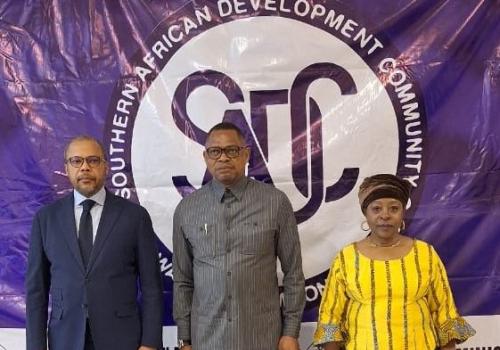The Southern African Development Community (SADC) Secretariat, in collaboration with the National Institute of Statistics and Ministry of Posts and Telecommunications in Democratic Republic of Congo, officially opened the Regional Workshop on ICT Statistics and Enhancement of the SADC ICT Observatory in Kinshasa, Democratic Republic of Congo. The five-day workshop, which is being held from 25–29 August 2025, is convened under the framework of the SADC Regional Statistics Project and aims to support the implementation of the SADC Protocol on Statistics and the SADC Regional Indicative Strategic Development Plan (RISDP) 2020-30.
The event was officially opened by the Honourable José Mpanda, Minister of Posts and Telecommunications of the DRC, alongside Ms. Angele Makombo N’Tumba, SADC Deputy Executive Secretary for Regional Integration.
In his keynote remarks, Minister Mpanda welcomed delegates to the DRC and emphasised that ICT statistics are vital for evidence-based policymaking, reducing the digital divide, and ensuring inclusive socio-economic growth across the region. He highlighted that the DRC, under the vision of President Félix Antoine Tshisekedi Tshilombo, is prioritising digital technologies as a lever for development.
“The workshop presents a unique opportunity to strengthen our capacities to collect, analyse, and use reliable ICT data to inform policies, measure the impact of our actions, and correct inequalities in ICT service provision,” he said.
Minister Mpanda also reaffirmed the DRC’s commitment to regional and international initiatives, including SADC, ECCAS, and the EAC, to harmonise data collection and contribute actively to the SADC ICT Observatory.
Speaking at the opening, Ms. Angele Makombo N’Tumba, SADC Deputy Executive Secretary for Regional Integration, underscored the growing demand for timely, quality, and disaggregated data to drive the regional development agenda. She stressed that ICT statistics are a cornerstone of the SADC Regional Integration Agenda, noting that ICT is a cross-cutting enabler for all sectors.
She highlighted the importance of leveraging mobile phone data, geospatial tools, and Big Data sources to complement traditional data collection methods and support the region’s digital transformation.
The workshop brings together ICT Observatory focal persons from Ministries, Regulatory Authorities, and National Statistics Offices across all sixteen (16) SADC Member States. Participants will review statutory decisions and international initiatives on ICT observatories, explore integration of innovative data sources, and discuss broadband indicators and 2030 targets.
As part of the programme, Member States will also exchange case studies on national ICT observatories, identify capacity-building needs, and contribute to the enhancement of the SADC ICT Observatory web portal and database system.
The workshop outcomes are expected to include updated lists of ICT indicators, proposals for broadband and postal indicators, and the drafting of a Concept Note for further enhancement of the SADC ICT Observatory. These outputs will inform the next SADC ICT Ministers’ Meeting and ensure alignment with the SADC RISDP 2020-30 and Protocol on Statistics.
The SADC ICT Observatory is envisioned as a central policy intelligence tool and a reference point for reliable, harmonised ICT indicators across the region. By strengthening the Observatory, SADC aims to empower decision-makers, foster innovation, and reduce the digital divide for the benefit of its citizens.
| Attachment | Size |
|---|---|
| Remarks by Minister Jose Mpanda.pdf | 183.98 KB |
| Remarks by Ms Angele Makombo N'Tumba-SADC Deputy Executive Secretary .pdf | 147.11 KB |

